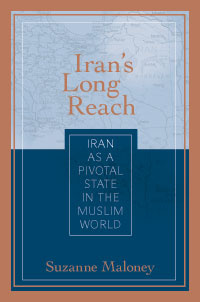IRAN’S LONG REACH Iran as a Pivotal State in the Muslim World

Iran as a Pivotal State in the Muslim World
Book Review
“Suzanne Maloney has written an insightful and sober analysis of Iran as a ‘pivotal state’ that poses a major strategic challenge to its neighbors and to the security interests of the United States. She captures the external factors that have increased Iranian influence in recent years and the internal contradictions that could dramatically alter Iran’s path. She has also suggested sensible ways to engage a country that will remain pivotal for the foreseeable future because of its location, resources, and revolutionary ideology. Iran’s Long Reach is a valuable addition to current scholarship on Iran.
By virtue of its size, history, resources, and strategic location, Iran under any circumstances would pose particular relevance for American policy, but the 1979 revolution and the political system that it wrought placed Iran squarely at the heart of U.S. security challenges. As the third book in the series from the Institute’s Muslim World Initiative on pivotal states in the Muslim world, this lucid and timely volume sheds much-needed light on Iran’s strikingly complex political system and foreign policy and its central role in the region. Suzanne Maloney systematically outlines Iran’s sources of influence in the Muslim world, including its strategic ambitions and dynamism, political innovations, economic clout, religiocultural institutions, and historical and cultural linkages. Maloney argues that although its leadership and rhetoric often appear stagnant, Iran is in reality one of the least static societies in the Muslim world. Iran today is fraught with pressures and tensions as a result of a disproportionately young population, an economy subject to considerable external pressures and cyclical fluctuation, and the massive transformations occurring along its borders in Iraq and Afghanistan. Maloney analyzes the social, economic, and regional forces that are driving Iran toward change and asks what these factors mean for U.S. foreign policy. She concludes that despite historical, legal, and practical constraints, the United States must ultimately engage Iran on a range of issues. Insightful and balanced, this volume presents a realistic, precise, and objective assessment of Iran for policymakers, academics, as well as the interested public.

